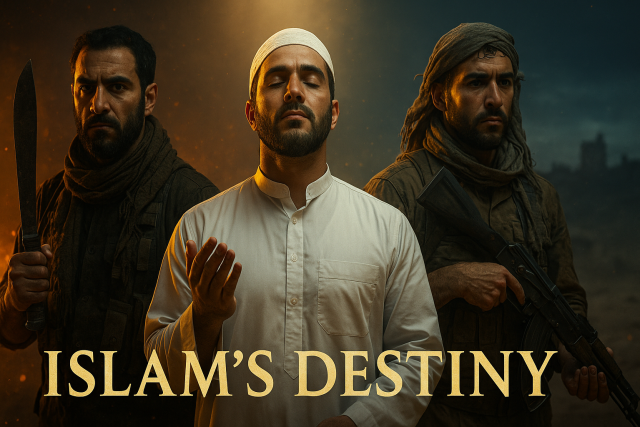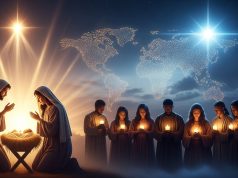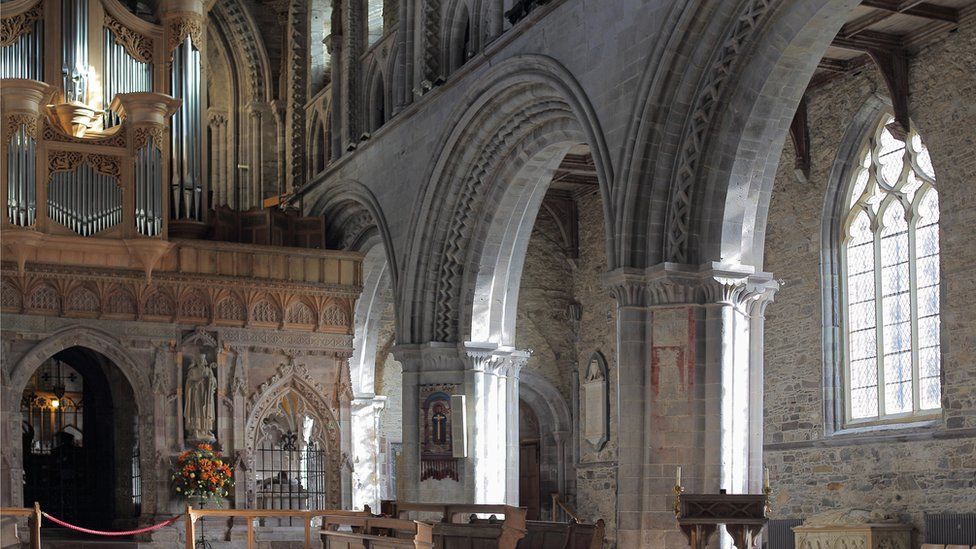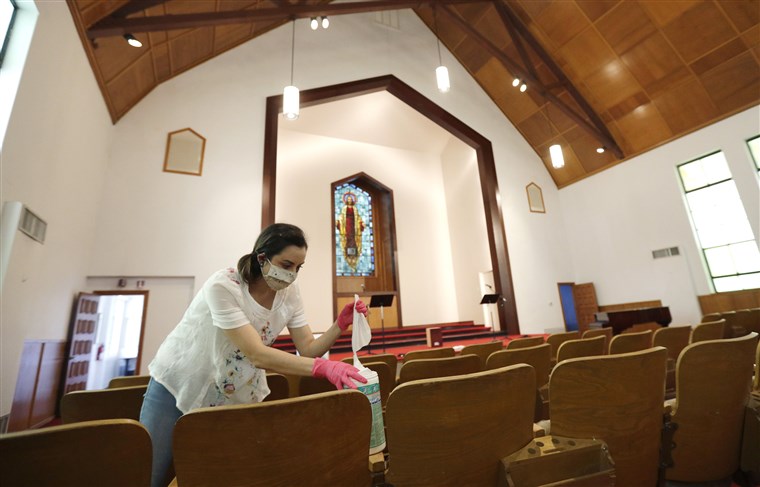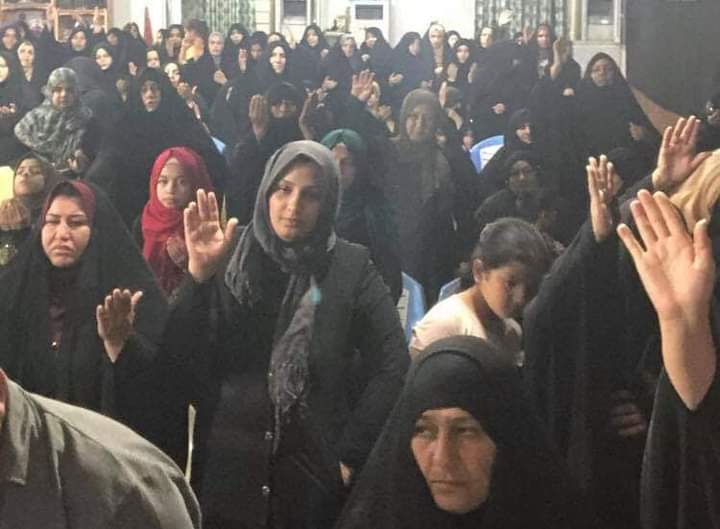The Biblical Destiny of Islam in Bible Prophecy
Have you ever wondered why God allowed Islam to rise — a faith that now shapes over a billion lives, often standing in tension with Christianity and Israel? From the tents of Abraham to the deserts of Arabia, from the blood of martyrs in Nigeria to the battles raging in Gaza, every headline seems to echo an ancient story.
The Bible does not leave this mystery unanswered. It predicted Islam’s origin through Ishmael, its global spread, and its role in the final chapters of prophecy. This article explores the biblical destiny of Islam — tracing its birth, its wars, and its prophetic future according to Scripture.
The Biblical Destiny of Islam in Bible Prophecy
1. The Promise That Divided the World
Long before the world heard the cry Allahu Akbar, before swords clashed across the deserts of Arabia, a single decision inside a family changed human history.
In Genesis 16, Abraham and Sarah faced a crisis of delay. God had promised a child of destiny, but years of barrenness eroded hope. Sarah proposed what seemed reasonable—“Go in to my maid Hagar; perhaps I shall obtain children by her.”
ALSO, READ DOWNLOAD PDF: Nigeria’s Silent Slaughter: The Hidden Christian Genocide Exposed
From that moment, two lines were born: Isaac, the child of promise, and Ishmael, the child of human impatience. Scripture records God’s dual blessing and boundary:
“In Isaac shall thy seed be called.” – Genesis 21:12
“Behold, I have blessed him [Ishmael] and will make him fruitful and will multiply him exceedingly… twelve princes shall he beget, and I will make him a great nation.” – Genesis 17:20
The covenant would pass through Isaac, yet Ishmael would not be forgotten. In divine sovereignty, both sons carried destiny—one spiritual, one temporal. From Ishmael’s descendants arose tribes that spread through the Arabian Peninsula: Kedar, Nebaioth, Dumah—names etched in the Bible and in Arab genealogies today.
Thus began the tension prophesied in Genesis 16:12: “He will be a wild man; his hand will be against every man, and every man’s hand against him.”
This is not racial hostility but a prophetic pattern—restlessness, conquest, and enduring presence before his brothers.
2. From Desert Tribes to a Global Faith
For centuries, the line of Ishmael wandered the deserts, trading incense and spices along caravan routes from Egypt to Mesopotamia. The ancient Hebrew prophets often referenced Kedar—a symbol of nomadic strength and archery skill (Isaiah 21 16-17).
ALSO, READ Jesus Christ Abolished The 10 Commandments – Pastor Chris Oyakhilome
By the sixth century AD, Arabia was a mosaic of tribes bound by blood yet divided by idols. In 570 AD, in Mecca, a child named Muhammad ibn Abdullah was born into the Quraysh tribe. History remembers him as Al-Amin—“the trustworthy.”
At forty, while meditating in the cave of Hira, he claimed to receive revelations from the angel Jibril (Gabriel). The message: “There is no god but Allah, and Muhammad is His messenger.”
From those words, Islam emerged—first as a reform against idolatry, then as an empire by the sword. Within one century, the green banner of Islam stretched from Arabia to North Africa, Persia, and Spain.
When Jerusalem fell to Muslim armies in 637 AD, Jesus’ prophecy was fulfilled:
“Jerusalem shall be trodden down of the Gentiles, until the times of the Gentiles be fulfilled.” – Luke 21:24
For over 1,300 years, the city remained under Islamic rule—its skyline crowned by the Dome of the Rock, where Solomon’s Temple once stood.
Islam’s rise was not random. According to Scripture, God allows empires to rise and fall to serve His redemptive design. Daniel 2:21 declares: “He changes times and seasons; He removes kings and sets up kings.”
YOU CAN WATCH THE VIDEO EXPOSITORY HERE
3. Why God Permitted Islam
The Bible gives at least three theological reasons why such a vast religious civilization could exist under divine permission.
A. A Test of Faith
From Eden to Babel, God has tested humanity’s allegiance. Deuteronomy 13:3 warns, “The Lord your God is testing you, to know whether you love the Lord your God with all your heart.”
Islam affirms monotheism yet denies Christ’s deity and cross. That denial itself becomes the test. 1 John 2:23 states plainly: “Whoever denies the Son does not have the Father.”
Thus, the existence of Islam distinguishes between those who revere God in concept and those who know Him in Christ.
B. A Tool of Discipline
Throughout Scripture, God disciplines His people through foreign powers. Babylon humbled Judah; Rome crucified the Messiah. Likewise, when the early Church grew political and complacent, Islam’s advance exposed its spiritual lethargy.
Cities that had been centers of early Christianity—Antioch, Alexandria, Damascus—fell within decades. Their loss echoed God’s warning that truth neglected invites correction.
C. A Sign of the End Times
Prophecy situates Islam inside the eschatological landscape. Ezekiel 38–39 foretells a coalition of nations—Persia (Iran), Cush (Sudan/Ethiopia), Put (Libya), and Togarmah (Turkey)—uniting against Israel.
All are now part of or allied with the Muslim world. Coincidence? Or divine chronology unfolding?
4. The Shadow Over the Present Age
Fast-forward to today’s headlines. The same geographic ring described by Ezekiel surrounds Israel. From Tehran to Tripoli, from Ankara to Khartoum, Islamic nations frame the map like a prophetic wreath of fire.
The Nigerian Tragedy
In West Africa, the prophecy of “hand against every man” manifests through Boko Haram and allied jihadist groups. The name itself means “Western education is forbidden.”
Over the last decade, more than 50,000 Christians have been murdered; thousands of churches have been torched. Villages once alive with worship now echo with mourning. Each drop of blood becomes a testimony that faith endures beyond fear.
The Middle-Eastern Web
In Lebanon, Hezbollah—the “Party of God”—serves Iran’s ambitions. In Gaza, Hamas renews ancient hostility against Israel. Across the Red Sea, militias in Sudan and Yemen perpetuate the same conflict of the covenant lines.
Psalm 83:4 captured their spirit millennia ago:
“They have said, Come, let us cut them off from being a nation; that the name of Israel may be remembered no more.”
Yet, Israel stands—outnumbered but undefeated. Her survival is not political ingenuity but prophecy preserved.
5. Prophecy in Modern Politics
When the United States recognized Jerusalem as Israel’s capital in 2017, outrage spread through much of the Muslim world. But in heaven’s chronology, Zechariah 12:3 advanced another notch:
“I will make Jerusalem a burdensome stone for all peoples; all that burden themselves with it shall be cut in pieces.”
Every administration, every alliance touching that city unwittingly steps into prophetic terrain. Even secular leaders become instruments in the clockwork of God’s timetable.
Look at the map again. The nations poised around Israel today are the same ones ancient prophets listed by name. Scripture, geopolitics, and satellite imagery align with unsettling precision.
6. The Spiritual Meaning: Two Covenants, Two Approaches to God
Paul interpreted the story of Hagar and Sarah not merely as family drama but as theological allegory (Galatians 4 : 22-31).
- Hagar represents the covenant of works—human effort, law, and bondage.
- Sarah symbolizes grace—the supernatural birth of promise.
“Cast out the bondwoman and her son, for the son of the bondwoman shall not be heir with the son of the free woman.” (v. 30)
In other words, human striving—no matter how sincere—cannot produce divine inheritance. Salvation by works, ritual, or law will always collide with salvation by grace through faith in Christ.
Islam embodies humanity’s noble but futile attempt to reach God by discipline and obedience. Christianity declares the opposite: God reached down to humanity through the cross.
“By grace are ye saved through faith; and that not of yourselves: it is the gift of God.” – Ephesians 2 : 8-9
Ishmael is a human effort. Isaac is divine grace. Flesh versus promise—still the world’s defining conflict.
7. The Persecuted Church: Faith Amid Fire
The most authentic proof of prophecy is endurance. Across the Islamic belt, small congregations continue to worship under threat.
In Northern Nigeria, girls whisper hymns as militants surround their villages.
In Pakistan, believers meet secretly in basements.
In Syria and Iraq, remnants of ancient Christianity cling to ruins of once-thriving cathedrals.
Revelation 6:9 pictures them beneath heaven’s altar: “I saw the souls of those who had been slain for the word of God.”
Their suffering is not forgotten. It testifies that the covenant through Isaac—the promise of redemption by grace—still lives. Their blood becomes seed for the final revival.
8. The Coming Alignment of Nations
Prophecy does not end with persecution; it converges toward confrontation.
The Bible foresees a moment when the world’s religious and political powers merge under two figures: the Beast (a global political system) and the False Prophet (a worldwide religious deception) – Revelation 13.
John writes: “He had two horns like a lamb, but he spoke like a dragon.” (v. 11)
A religion that appears gentle yet denies Christ fits this imagery with eerie resemblance. Islam venerates Jesus as a prophet but denies His deity, crucifixion, and resurrection—the very pillars of the Gospel.
Whether Islam itself becomes the vehicle of that final deception or merely contributes to it, the pattern is unmistakable: a global faith system that unites nations against Israel and the Lamb.
9. The Fall of Empires and the Triumph of Christ
History’s empires share a single epitaph: they fell.
Babylon collapsed.
Persia waned.
Rome disintegrated.
And Islam—powerful, disciplined, vast—will one day kneel before the same throne as all others.
Revelation 19 20 describes the end: “The Beast was taken, and with him the False Prophet… these both were cast alive into a lake of fire burning with brimstone.”
No ideology that denies the Son will endure. The only government with no sunset clause is the Kingdom of Jesus Christ.
“The kingdoms of this world have become the kingdoms of our Lord and of His Christ, and He shall reign forever.” – Revelation 11 : 15
10. Reading the Signs of the End
Prophecy has moved from parchment to push notification.
Wars and rumors of wars—check.
Earthquakes, famines, moral decay—check.
Israel surrounded—check.
Each crisis accelerates the countdown. The valley of decision (Joel 3 14) is no longer metaphorical; it is visible on satellite images of the Valley of Megiddo. Scripture predicts that armies will gather there, only to be shattered by the returning Christ: “He shall smite the nations… and He treads the winepress of the fierceness of the wrath of Almighty God.” – Revelation 19:15
11. The Hope Beyond Conflict
While the narrative of Islam and prophecy can sound grim, its conclusion is profoundly redemptive. God’s objective is not annihilation but salvation. 2 Peter 3:9 affirms that He is “not willing that any should perish, but that all should come to repentance.”
In the end, Scripture envisions a reconciled humanity: “There is neither Jew nor Greek… for you are all one in Christ Jesus.” – Galatians 3:28
Even descendants of Ishmael are invited into grace through the same Messiah descended from Isaac. Countless former Muslims today testify to visions of Christ calling them by name—fulfilling God’s mercy to every lineage of Abraham.
12. A Personal Warning and Invitation
Prophecy is not entertainment; it is an invitation. Every fulfilled sign shouts the same message: the trumpet is near.
Religion cannot save. Ritual cannot redeem. Only the blood of the Son of God can cleanse sin.
If you have read this far, the call is simple yet eternal:
“I am the way, the truth, and the life; no one comes to the Father except through Me.” – John 14 : 6
Surrender is not defeat; it is deliverance. Receive the grace that no effort can earn.
Conclusion: The Destiny of Nations
From the tent of Abraham to the cities of modern Islam, from the deserts of Arabia to the churches of Nigeria, the same divine narrative moves steadily forward.
Human ambition builds religions and empires; divine purpose builds redemption.
The story ends not in Mecca or Jerusalem, but before a heavenly throne where “every knee shall bow and every tongue confess that Jesus Christ is Lord.” – Philippians 2:10-11
Until then, believers must watch, pray, and proclaim. The persecution of today, the politics of tomorrow, and the prophecies of old all converge on one truth: Christ reigns.
“For the earth shall be filled with the knowledge of the glory of the Lord, as the waters cover the sea.” – Habakkuk 2:14

